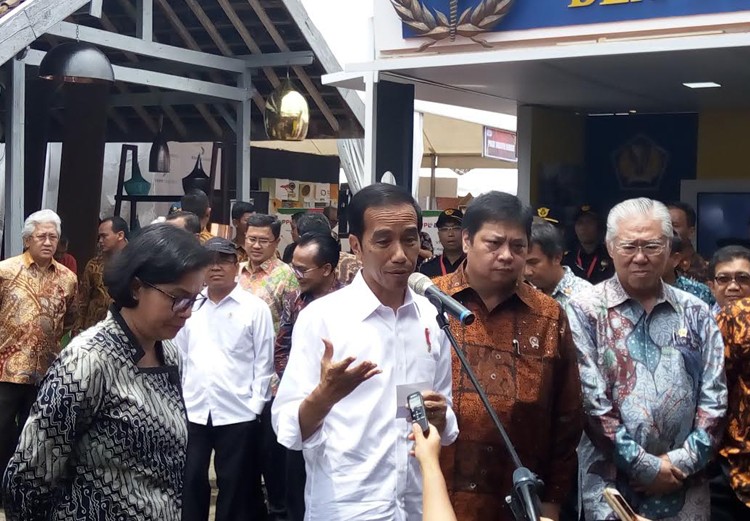Popular Reads
Top Results
Can't find what you're looking for?
View all search resultsPopular Reads
Top Results
Can't find what you're looking for?
View all search resultsFood and beverage exporters lament ‘high import tariffs’ in new markets
Change text size
Gift Premium Articles
to Anyone
 President Joko "Jokowi" Widodo (center), accompanied by a number of ministers, speaks at an event to launch tax waivers for export-focused small and medium enterprises in Tumang village, Boyolali, Central Java, on Jan. 30. The government advised business players to use the waivers to improve the quality of their export products. (JP/Anton Hermansyah)
President Joko "Jokowi" Widodo (center), accompanied by a number of ministers, speaks at an event to launch tax waivers for export-focused small and medium enterprises in Tumang village, Boyolali, Central Java, on Jan. 30. The government advised business players to use the waivers to improve the quality of their export products. (JP/Anton Hermansyah)
D
omestic food and beverage producers have raised concerns about high import duties charged by non-traditional export destinations in Africa and Latin America.
Indonesian Food and Beverage Association (GAPMMI) chairman Adhi Lukman said these import tariffs ranged between 20 percent and 40 percent.
“This contradicts the government’s push to increase exports to non-traditional markets, and therefore the government needs to do something to address it,” he said during a breakfast meeting for businesspeople at the Industry Ministry on Tuesday.
Food and beverages are among the main items Indonesian producers ship to Africa and Latin America.
The Trade Ministry’s director general for foreign trade, Oke Nurwan, acknowledged the problem, saying the respected countries should be approached on the matter.
“Our food and beverage industry sees a trade deficit, because of the low competitiveness caused by tariff barriers, among other factors,” he said. “We need time to negotiate with the countries, and while we do that, they can use available facilities like import tax waivers for materials for export-oriented goods [KITE].”
Through KITE, small and medium-sized manufacturers can apply for tax exemption if they export 75 percent of their overall production.
Indonesia experienced a US$767.84 million deficit in its food and beverage trade with the rest of the world from January to November 2016, according to GAPMMI data, up from a $276.09 million deficit in the full year of 2015. (lnd)









